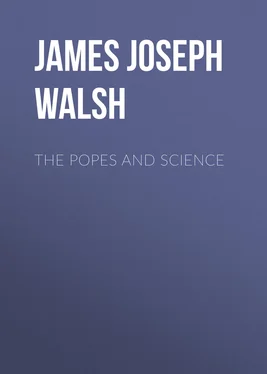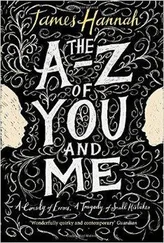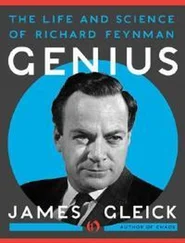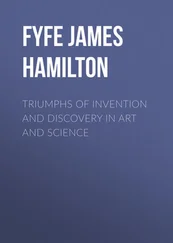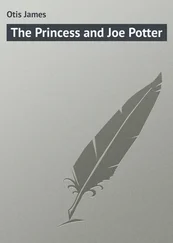James Walsh - The Popes and Science
Здесь есть возможность читать онлайн «James Walsh - The Popes and Science» — ознакомительный отрывок электронной книги совершенно бесплатно, а после прочтения отрывка купить полную версию. В некоторых случаях можно слушать аудио, скачать через торрент в формате fb2 и присутствует краткое содержание. Жанр: foreign_prose, foreign_religion, foreign_antique, на английском языке. Описание произведения, (предисловие) а так же отзывы посетителей доступны на портале библиотеки ЛибКат.
- Название:The Popes and Science
- Автор:
- Жанр:
- Год:неизвестен
- ISBN:нет данных
- Рейтинг книги:4 / 5. Голосов: 1
-
Избранное:Добавить в избранное
- Отзывы:
-
Ваша оценка:
- 80
- 1
- 2
- 3
- 4
- 5
The Popes and Science: краткое содержание, описание и аннотация
Предлагаем к чтению аннотацию, описание, краткое содержание или предисловие (зависит от того, что написал сам автор книги «The Popes and Science»). Если вы не нашли необходимую информацию о книге — напишите в комментариях, мы постараемся отыскать её.
The Popes and Science — читать онлайн ознакомительный отрывок
Ниже представлен текст книги, разбитый по страницам. Система сохранения места последней прочитанной страницы, позволяет с удобством читать онлайн бесплатно книгу «The Popes and Science», без необходимости каждый раз заново искать на чём Вы остановились. Поставьте закладку, и сможете в любой момент перейти на страницу, на которой закончили чтение.
Интервал:
Закладка:
Before either of these men there had been a third distinguished English physician who had gone down to Italy for his education. This was the celebrated and learned John Phreas, who was born about the commencement of the fifteenth century. Very little is known of his career, but what we do know is of great interest. He was educated at Oxford and obtained a fellowship on the foundation of Balliol College. Afterward he seems to have studied medicine with a physician in England, but was not satisfied with the medical education thus obtained. He set the fashion for going down into Italy sometime during the first half of the fifteenth century, and after some years spent at Padua received the degree of doctor in medicine, which in those days carried with it, as the name implies, the right to teach. As not infrequently happens to the brilliant medical student, he settled down for practice in the university town in which he graduated, to take up both occupations, that of teacher and practitioner. He is said to have made a large fortune in the practice of physic. [Footnote 12] The best proof of his scholarship is to be found in some letters still preserved in the Bodleian and in the Library of Balliol College. Personally, I have considered that his career was interesting from another standpoint. I have often looked in history for the cases of appendicitis which occur so frequently in our day and with regard to which people ask how is it they did not occur in the past. The fact is, they did occur, but were unrecognized. People were taken suddenly ill, not infrequently a short time after a meal, and after considerable pain and fever, swelling and great tenderness in the abdomen developed, and they died with all the signs of poisoning. They were actually poisoned, not by some extraneous material, but by the putrid contents of their own intestines which found a way out through the ruptured appendix. These cases were set down as poisoning cases, and usually some interested person was the subject of suspicion. Dr. Phreas's learning had obtained for him an appointment to a bishopric in England, a curious bit of evidence of the absence of opposition between medical science and religion in his time. He died shortly after this, under circumstances that raised a suspicion of poisoning in the minds of some of his contemporaries–but raises the thought of appendicitis in mine,–and one of his rivals was blamed for it.
[Footnote 12: Like the other distinguished physicians of this time, John Phreas did not devote himself to medicine alone. He had a taste for literature, and besides being an accomplished scholar he was a poet.]
Nor did the custom for English medical students to go down to Italy to complete their education cease with the so-called reformation. Some two generations after Vesalius's time another distinguished Englishman, Harvey, went down to Italy to complete the studies he had already made and eventually to lay the foundation of that knowledge on which he was twenty years later to construct his doctrine of the circulation of the blood. This doctrine, however, remained merely a theory until the distinguished Italian anatomist, Malpighi, after another half century, demonstrated the existence of the capillaries, the little blood vessels which connect the veins and arteries, and by thus showing the continuity of both the blood systems, proved beyond all doubt the certainty of the teaching that the blood does circulate.
Students came, moreover, from even the distant North of Europe to the Italian schools of medicine during these centuries. Neil Stensen, or as he is perhaps better known by his Latin name, Nicholas Steno, the discoverer of the duct of the parotid gland, which has been named after him, and of many other anatomical details, especially of the fact that the heart is a muscle, which stamp him as an original investigator of the highest order, after having made extensive studies in the Netherlands and in France to complete the medical education which he had begun in his native city of Copenhagen, went down into Italy to secure freer opportunities for original research than he could obtain anywhere else in Europe. [Footnote 13]
[Footnote 13: It may perhaps be of interest to say that while doing investigation in anatomy and certain other sciences allied to medicine, Steno became a convert to the Catholic Church and after some years became a priest. Before his ordination, however, though after his conversion, he received the call to the chair of anatomy at Copenhagen. He accepted this and worked for several years at the Danish University, but was dissatisfied with the state of affairs around him as regards religion and went back to Italy. Eventually he was made a bishop–hence the curious picture of him in a Roman Catholic Bishop's robes in the collection of pictures of professors of anatomy at the University of Copenhagen. Not long after, at his own request, he was sent up to the Northern part of Germany in order to try to bring back to the Church as many of the Germans as might be won by his gentleness of disposition, his saintly character, his wonderful scientific knowledge, and his winning ways. He is the Father of Modern Geology as well as a great anatomist, and his little book on geology was published after he became a priest, yet did not hamper in any way his ecclesiastical preferment nor alienate him from his friends in the hierarchy. He was honored especially by the Popes. In a word, his career is the best possible disproof of any Papal or ecclesiastical opposition to science in his time.]
We have mentioned that it was while he was pursuing his special investigations in various Italian universities that Stensen was honored with the invitation to become professor of anatomy at the University of Copenhagen. This was not a chance event, but a type of the point of view in university education at the time. Just as at the present time the prestige of research in a German university counts for much as a recommendation for professorships in our American universities, so in the sixteenth and seventeenth centuries was it with regard to study in Italy. It was felt that men who had spent several years there could be reasonably expected to know all that there was to be known in the rising sciences of anatomy and physiology; at the same time there was a very general impression, quite justified by the results observed, that those who did their post-graduate work in Italy were nearly always sure to make discoveries that would add to the prestige of their universities later, and that would be a stimulus to students and to the other teachers around them such as could be provided in no other way. If read in the proper spirit, the history of the universities of those times is quite like our own, only for influence, the name of Italy must always be substituted for that of Germany. Yet Italy, if we were to believe some of the writers on the history of education and science, was at this time laboring under the incubus of ecclesiastical intolerance with regard to anatomy and an almost complete suppression of opportunities for dissection. Those who write thus know nothing at all of the actual facts of the history of science, or else they are blinding themselves for some reason to the real situation.
Fortunately students of the facts of history, especially those who have devoted any serious attention to the history of medicine, make no such mistake. For them it is perfectly clear that there was a wonderful development in anatomy which took place down in Italy, beginning about the middle of the fifteenth century or even earlier, and which led to the provision of such opportunities for dissection and original research in medicine, that students from all over the world were attracted there. For instance, Professor Clifford Allbutt, in the address on the Historical Relations of Medicine and Surgery to the end of the Sixteenth Century, already quoted, has a passage in which, as an introduction to what he has to say about Galen, he sums up the history of anatomy from the return of the Popes from Avignon to Rome, which took place just about the beginning of the last quarter of the fourteenth century, down to the time of Vesalius. This expresses so well what I have been trying to say with regard to the gradual development that led up to the Golden Age of Anatomy and to Vesalius's work, that I quote it.
Читать дальшеИнтервал:
Закладка:
Похожие книги на «The Popes and Science»
Представляем Вашему вниманию похожие книги на «The Popes and Science» списком для выбора. Мы отобрали схожую по названию и смыслу литературу в надежде предоставить читателям больше вариантов отыскать новые, интересные, ещё непрочитанные произведения.
Обсуждение, отзывы о книге «The Popes and Science» и просто собственные мнения читателей. Оставьте ваши комментарии, напишите, что Вы думаете о произведении, его смысле или главных героях. Укажите что конкретно понравилось, а что нет, и почему Вы так считаете.
